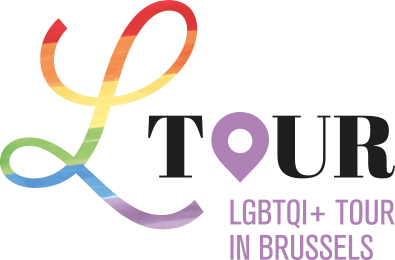A Different Perspective On Female Homosexuality
Lesbian Life in Brussels
8. März 2017 by Felicia Mutterer COMMENTS (0) SHARE TWEET PIN

Es ist ein feines, besonderes Festival in Belgien. Zweimal im Jahr zeigt das Girls Heart Brussels die besten Plätze für Frauen, die sich für queere Kunst, feministischer Kultur und lesbisches Leben interessieren. Die fünfte Ausgabe steigt vom 21. bis 23. April 2017 in Brüssel. Im Hotel Bloom wird übernachtet und das Programm ist vielfältig: Filmvorführungen, Perfomances, Party sowie Erkundungstouren. Die werden von der lesbischen Aktivistin Marian Lens geleitet, die den ersten feministischen und lesbischen Buchladen Artemys in Brüssel führte. Sie haben wir zum Gespräch getroffen, das wir in englisch mit ihr führten.
The lesbian activist Marian Lens, the founder of the first feminist and lesbian bookstore Artemys (1985-2012), still fights against the discrimination of women and minorities. STRAIGHT met Marian in Brussels during the Girls Heart Brussels Weekend.
What is better today than in 1985 when you opened the bookstore?
A new community of young people belonging to the generation aging between 20 and 35 is wanting to make deeply positive and ethical change of the society. They are ready to get all possible information to succeed it, and really looking forward to answers, analyses and political experiences helping them to reach their goals. It is quite new to me, having people wanting to listen to activists and sociologists who are since the ‚1970ties and ‚1980ties putting into questions „to the roots“ the heterosocial model of society we are living in. This younger generation really want to hear a more critical explanation than a „gender“-based one of the society. They want to hear terms like the „domination“ of „women“ by „men“, or that „heterosexuality“ might be used as a normative way to structure society. During the L-tour of Brussels there is much interest when I do explain that Brussels is the place in the world when was launched in 1976 the political notion of „forced heterosexuality as a crime against women“, during the International Tribunal on Crimes Against Women. Over 2000 women attended this first lesbian and women’s world event. Brussels was chosen because it was accessible for women all over the world. This political notion is nowadays obvious when we are talking about forced marriage on girls and women in a lot of countries in the world, or what Boko Aram and IS are doing by putting girls and women into sexual slavery.
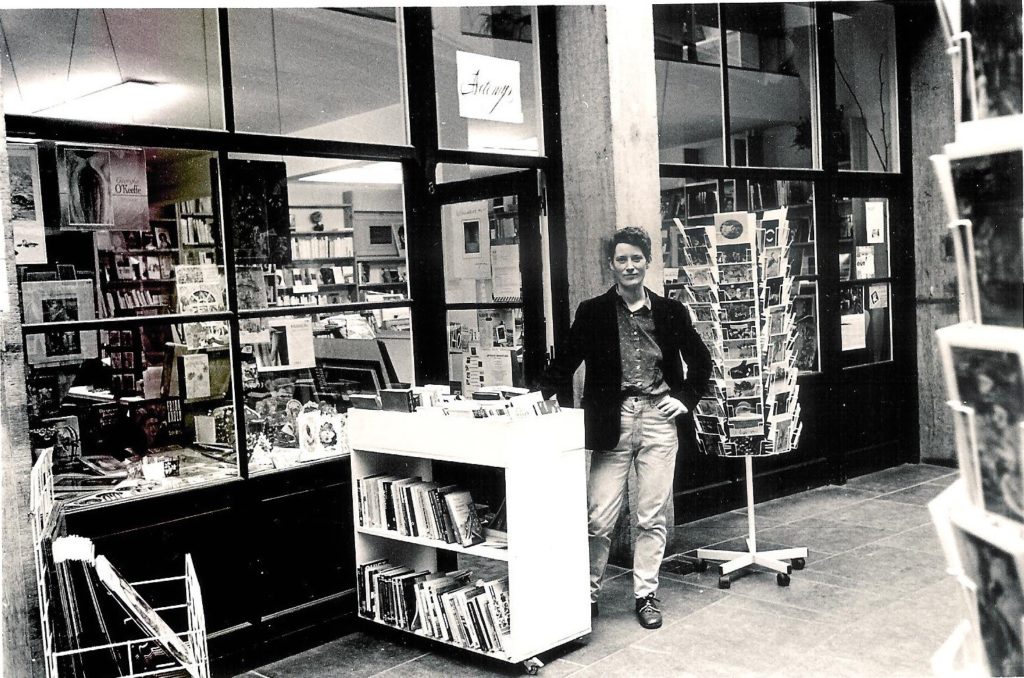
Marianne Lens 1993 / ArtemysBortierGalerijFotoDoorAnnemieLauryssensVoorSymforosaArtikelMaart1993
Why did you open your store at that time?
For me „selling“ books was „selling“ ideas. Organising debates around them, inviting other active lesbians and women, going everywhere with the books (on fairs, abroad,…),…, was a brilliant way for exchanges in order to change positively this world.
How hard was it to lead such a niche bookstore for years?
It was very very hard. In the European Community of then (15 countries), Belgium was with Greece the country that had the lowest rate of reading amongst people. There is no culture or pride to read. A successful person was considered as having „no time to read“. A terrible stereotype. Because of course, it is the contrary that is true. Information is always essential in a democracy. Information is the first thing a dictatorship is censuring.
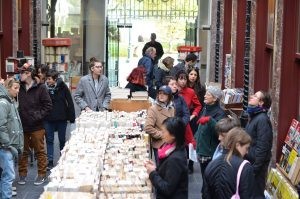
How do you experience women’s lesbian life in the city today?
Being a lesbian is still somehow difficult. It is still invisibilized. Belgium is the second country in the world that extended in 2003 marriage to homosexuals. Anyhow, three years ago, I had to report an aggression to the Police. When my wife left home at 4 o’clock in the middle of the night to get her plane for her job, she found a paper placated on our street front door mentioning we were „faggots“. She found another one placated on our car. She had been deeply shocked. As a long time activist, I gave her the basics for her safety. For the sake of safety I informed my homosexual neighbours about it. They received the bad news as an even great shock themselves, for one of them was living there since childhood, and had never been living that kind of nasty aggression as a homosexual guy.
Now, it is nothing to compare with the eighties. At that time, it was really quite repressive. I was really surprised by those placates. And I could report the case. What was not imaginable more than 30 years ago.
Is there still necessary to have a niche for lesbian women today?
As long as discrimination do exist, a group that is living danger is needing places where every person of its community can just be a human being, being all what she wants to be, without any risk of jugdment or hostility.
Are there still many bars?
Not for lesbians. Gays do have a lot of them. We must not forget we are in difficult economical times. Women are still paying a much bigger price. To open a bar, you need money. The difference in means is still enormous between men and women.
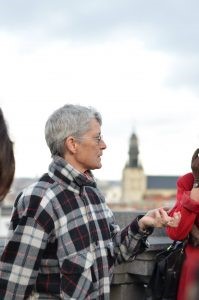
Marianne Lens is the Guid
Brussels invites to get to know the lesbian, feminine side of the city. What does the city have to offer more than others?
Brussels is since centuries very cosmopolitan. It is one of the rare cities in the world (New York or Jerusalem are other ones), where you hear almost every language existing being spoken. With almost all of the biggest Worldwilde political an economical Organizations and Institutions concentrating in Brussels, almost all nationalities are represented here. It is a real human richness.
It really helped Artemys to sustain, even though Belgian readers were scarce. The international community really helped our organization to survive. We were the first open lesbian Not-Profit Making Association (asbl) in Belgium, and financial deciders (authorities, banks, …), had quite a hard time to help us, or only give us what we were supposed to get, as any other citizen.
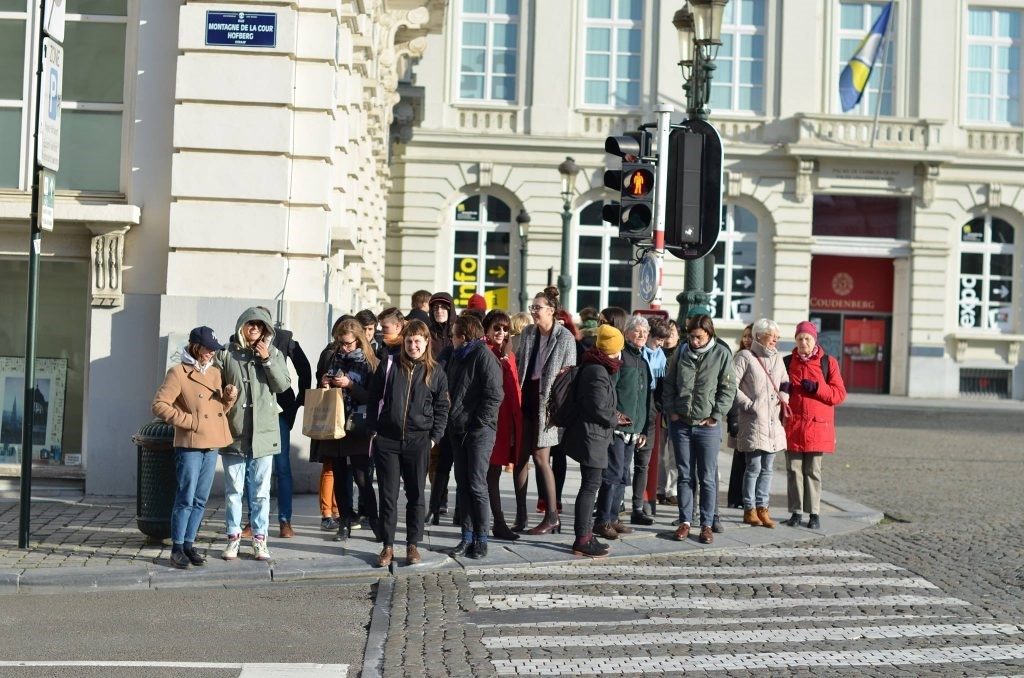
Women from whole Europe in Brussels for the Girls Heart Weekend
The Girls Heart Brussels Weekend invited an international audience – how can Brussels inspire?
Brussels is easy to reach, cheap to live in, used to content a very international public and keen to share her „Art-de-vivre“. Our community is fond to share what we have. Next big event in Brussels is the Belgian Pride that take place in May. More than 100.000 people are coming to this big event, from any part of the country and from abroad. During more than 2 weeks you have a lot of interesting events related to it. It has become one of the 10 biggest „tourist“ events of the Brussels Region. A very festive happening. It is one of the rare Pride in the world that still is basing the Pride on claims for rights of rainbow people in Belgium and in the world. This year the theme is the rights for LGBTQI+ asylum seekers in Belgium and in the world. We will organize 3 Tours during the Pride-Festival.
What place in Brussels are a must for women?
You can meet most of the lesbian associations at the RainbowHouse of Brussels. You can get there also information of lesbian happenings in Brussels (lesbian and rainbow herstory-rounds of the city, meetings, films, debates, parties, leisure,…).
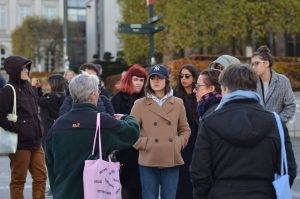
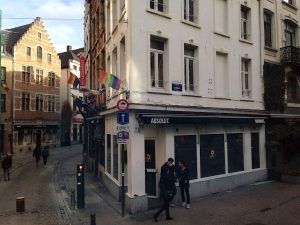
Where is your favourite place?
At the moment, it certainly is the RainbowHouse of Brussels. It is a federation of over 50 LGBTQI+ associations, most of Brussels Region. L-tour is a member of it, and our lesbian and rainbow herstory and history tours of the city and its international links, are always ending there. That give the possibility to meet lesbian and rainbow groups.
Adressen in Brüssel:
Hotel:
Jam Hotel, Chaussée de Charleroi 132
Hotel Bloom, Rue Royale 250
Drink:
Rainbowhouse, Kolenmarkt 42
Le Fontainas, Kolenmarkt 91
Eat:
Jour de Fête, Anspachlaan 181
Les Connes, rue des Teinturiers 6
Les Filles, rue du vieux marché aux grains 46
Le Pre Salé, Rue de Flandre 29
Knees to chin, 125 rue de livourne/ 28 Vlaamsesteenweg
View:
The best View on the city is next to the palais de justice, where downtown and uptown meet. Place Poelaert.
